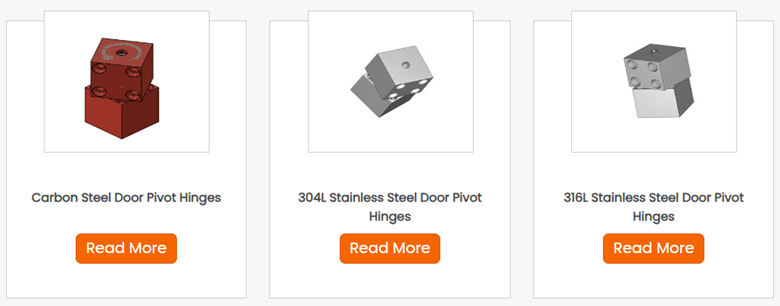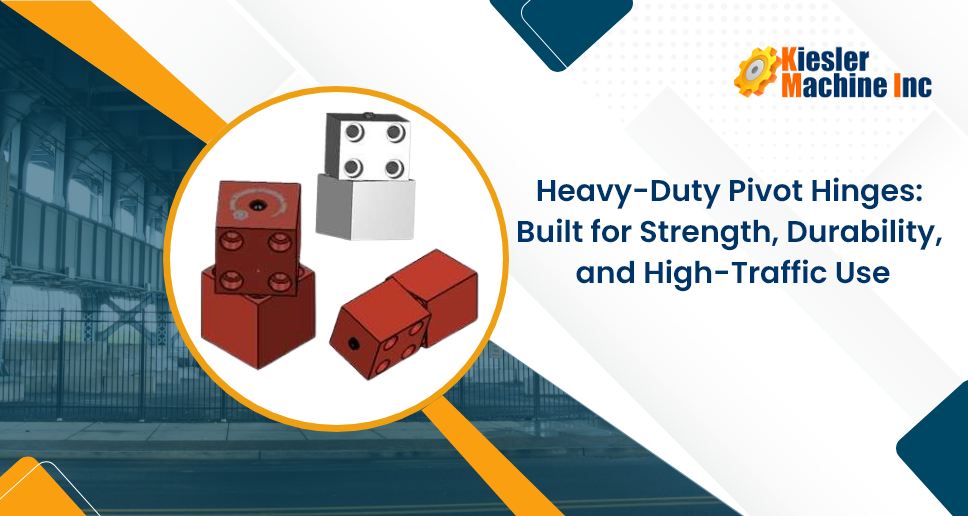Standard vs. Heavy-Duty Door Hinges: Which One is Right for You?
Are your commercial door hinges rusted, corroded, or squeaking? These hinges may not be suitable for high-traffic environments and may be overused and worn out. If yes, you may need to replace them with hinges made from superior metals. In high-traffic commercial settings,
heavy-duty door hinges are essential for durability and performance. These hinges are built to support heavy doors, withstand frequent use, and provide long-term reliability. Their configurations and weight-bearing capacities are way more than standard hinges. Made from sturdy metals, these door hinges for heavy doors can withstand frequent use without undergoing wear, and are resistant to corrosion, wet environments, and more. This post discusses various aspects of heavy-duty commercial and industrial door hinges, criteria to consider when selecting them, and their comparison with standard hinges.
Differences between Standard and Heavy-Duty Door Hinges
Both standard and heavy-duty commercial door hinges have unique characteristics that make them appropriate for different types of doors and environments.
Weight Capacity: The door’s weight plays a critical role in hinge selection.
- Standard Hinges: These hinges are designed for lighter doors. They are best suited for interior residential doors, such as bedroom or closet doors, where heavyweight and continuous strain are not the key factors.
- Heavy-Duty Hinges: In contrast, heavy-duty hinges are built to handle much more weight. They are ideal for heavier doors such as those found in commercial, industrial, or even large exterior residential spaces where durability and strength are paramount.
Material: The material from which the hinge is made affects its durability and strength.
- Standard Hinges: These hinges are typically crafted from lighter materials like steel, or some lightweight alloys. These materials are sufficient for light- to medium-duty doors used in homes and office spaces.
- Heavy-Duty Hinges: These hinges are made from durable materials such as stainless steel, cast iron, reinforced steel, or brass, which makes them resistant to wear and tear, even under substantial pressure and frequent use.
Size and Thickness: The hinge size should match the door's dimensions.
- Standard Hinges: These are generally smaller and thinner, which makes them suitable for lightweight interior doors.
- Heavy-Duty Hinges: These hinges are thicker and larger that can bear the weight of heavy-duty doors and withstand consistent use without failing.
Pin Design: Pin design impacts the ease of door removal and security.
- Standard Hinges: They often come with removable pins which is convenient for residential settings.
- Heavy-Duty Hinges: Fixed or non-removable pins are common in heavy-duty hinges for added security. This makes them ideal for high-traffic areas or environments requiring added safety, such as exterior or industrial doors.
Application: Selecting the right hinge is essential for ensuring durability and functionality.
- Standard Hinges: They work best for doors that experience moderate use, such as those in homes or offices. They provide adequate support for interior doors.
- Heavy-Duty Hinges: These are suited for high-traffic or commercial applications, where doors experience frequent use or need to support heavier weights, such as large entryways, industrial doors, or storage facility doors.

What to Look for When Selecting Heavy-Duty Commercial Door Hinges
Heavy-duty commercial door hinges are designed to meet the demands of industrial and heavy-duty applications, offering strength, durability, and reliability in challenging environments. Here are some features you can look for to get the right hinges for high-performance and high-traffic applications.
- Materials: Heavy-duty hinges must be made of sturdy metals with appropriate coatings to make them resistant to rust, corrosion, and more. Metals such as 304/304L Stainless Steel, 316/316L Stainless Steel, Carbon Steel Carbon Steel with Zinc Plating, or Carbon Steel with Hot Dipped Galvanized Coating work well for harsh environments or outdoor settings.
- Weight Capacity: Ensure the hinge can support the weight of your door, as insufficient capacity can cause sagging or misalignment. Heavy-duty hinges are engineered to support extremely heavy doors, with capacities ranging from 1,000 lbs (453.5 kg) to 40,000 lbs (18,143.7 kg). Ensure they can handle radial loads from 400 lbs (181 kg) to 25,000 lbs (11,339 kg) for reliable operation under substantial weight.
- Heights: Generally, ensure the range of their height is between 5″ and 16″, depending on the door height and weight, to meet the dimensional needs of different door systems.
- Hinge Pin Material: Hinges are equipped with pins made of hardened alloy steel to provide enhanced strength and long-lasting performance under heavy load conditions.
- Mounting Options: There are various mounting options, such as bolt-on and weld-on. It is essential to check their configurations, to ensure easy installation and compatibility with the door systems.
- Pivot Location: Bottom and top pivot hinges provide an even distribution of weight, which is ideal for larger doors.
- Fire Rating: For safety compliance, select fire-rated hinges for doors used in emergency exits or fire-rated rooms.

If your commercial or industrial doors require good-quality and
customisable heavy-duty hinges, ensure to source from a reliable and experienced player in this segment. Kiesler Machine is one of the leading suppliers of heavy-duty commercial door hinges in the UK. Our high-quality, precision-engineered door hinges for heavy doors are designed to meet rigorous demands, ensuring longevity and reliability in various commercial and industrial applications. Feel free to contact us on
info@kieslermachine.uk or +44 03330062686, in case you require further information on our heavy-duty exterior door hinges or commercial door hinges for interior doors.





